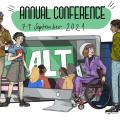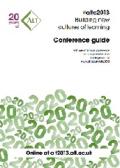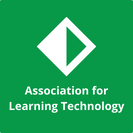Previous conference websites are retained for 18 months following the event. Important details about the events are archived here.

2024 - Doing, reflecting, improving, collaborating
Date: 3 - 5 September 2024
Location: Radisson Blu, Manchester Airport
Co-Chairs: Diane Bennett and Scott Farrow
Conference themes:
- Cultivating collaboration,
- Reviewing, reflecting, re-imagining,
- Inviting improvement,
- and emerging research.
Visit the 2024 conference website.
2023 - Celebrating 30 Years
Date: 5 - 7 September 2023
Location: University of Warwick, UK and online
Co-Chairs: Lawrie Phipps and Santanu Vasant
Conference themes
- Leading People in a time of complexity
- Diversity and Inclusion
- Sustainability and Social Justice
- Emerging technologies and behaviours
- Wildcard submissions

2022
Date: 6-8 September 2022
Location: University of Manchester, UK and online
Co-Chairs: Trustees of ALT
PDF Programme: 2022 Online pre-conference, 2022 in-person and 2022 online.
Conference themes
- Digital transformation beyond the crisis: what is your vision for learning, teaching and assessment? This theme is focused on how we are transforming education and training through digital practices in a post-pandemic world.
- Co-creation with learners: this theme explores how to use digital technology in partnership with learners to design sustainable approaches that work for everyone. How can we co-create student engagement and enjoyment and make the learning experience more open, inclusive and equitable?
- Emerging leadership for a new strategic vision: we are seeing a growth in more strategic responsibilities in roles with a focus on digital education and training. This theme is dedicated to the work and vision of both emerging and established leaders in both institutional and community roles seeking to share their expertise and learn from like-minded colleagues in a dedicated leadership strand of this year’s event.
- Developing Digital Fluency: there has been a big shift in the digital skills and capabilities that we need to develop and recognise in both students and staff: from digital citizenship to critical data literacy and ethical considerations, what does it mean to develop digital fluency?
- AmplifyFE: this conference strand is dedicated to proposals from the FE and Vocational Education sector, and we encourage submissions that share expertise around digital tools and technologies, skills development and collaboration (not competition).
- Creativity wildcard: if your work doesn’t fit into the traditional research or practice themes, then this theme enables you to submit research, practice or policy proposals from any sector including Further Education, schools, vocational learning and training, lifelong learning and work-based learning.

2021
Date: 7-9 September 2021
Location: Online
Co-Chairs: Roger Emery, Farzana Latif and Matt Lingard
Themes: Shared Experience, Different Perspectives
- Leadership in learning technology
- Inclusive practice
- Digital well-being
- Digital and physical spaces

2020
Due to the global pandemic, ALT held an Online Summer Summit instead of an annual conference.
Date: 26-27 August 2020
Location: Online
Co-Chairs: N/A
PDF Programme: 26 August 2020, 27 August 2020 and Asynchronous 2020.
Theme: Learning Technology in a time of crisis, care and complexity

2019
Date: 3–5 September 2019
Location: University of Edinburgh
Co-Chairs: Melissa Highton, Louise Jones and Keith Smyth
PDF Programme: 2019 day 1, 2019 day 2, 2019 day 3
Theme: Data, Dialogue, Doing
- Student data and learning analytics
- Creativity across the curriculum
- Critical frames of reference
- Learning Technology for wider impact

2018
Date: 11-13 September 2018
Location: University of Manchester, UK
Co-Chairs: ALT Board of Trustees
Themes:
- Participation through Learning Technology: including how to use technology to work in partnership with learners, how to create engagement and built informed consent, critical digital literacy, accessibility and equity;
- Collaboration for Learning Technology: such as working together on projects, scaling up innovation, the role of staff empowerment and leadership, collaboration or across institutions and countries, how learning technology can enhance (a)synchronous collaboration;
- Critical perspectives in Learning Technology: critical, historical and political perspectives, research and analysis that question the purpose or impact of technology used for learning, teaching or assessment; learner driven education;
- Openness and Learning Technology: for example open education practice, resources, policy for openness in education, open data and open governance;

2017
Date:5 – 7 September 2017
Location: University of Liverpool, UK
Co-chairs: Pete Alston and Helen O’Sullivan
Theme: Beyond islands of innovation – how Learning Technology became the new norm(al)

2016
Date: 6 - 8 September 2016
Location: University of Warwick, UK
Co-chairs: Professor Nicola Whitton and Alex Moseley
Theme: Connect, Collaborate, Create

2015
Date: 8–10 September 2015
Location: University of Manchester, UK
Co-chairs: Professor Amanda Jefferies and Dr Liz Masterman
Theme: Shaping the Future of Learning Together

2014
Date: 1–3 September 2014
Location: Warwick, UK
Co-chairs: Sarah Cornelius, Linda Creanor and Joe Wilson
Theme: Riding Giants: How to innovate and educate ahead of the wave.

2013
Date: 10-12 September 2013
Location: Nottingham, UK
Co-Chairs: Haydn Blackey and Malcolm Ryan
Theme: Building new cultures of learning

2012
Date: 11-13 September 2012
Location: University of Manchester, UK
Co-chairs: Jonathan Drori, Sarah Sherman and Julie Voce
Theme: A confrontation with reality

2011
Date: 6-8 September 2011
Location: University of Leeds, UK
Co-chairs: John Cook and Sugata Mitra
Theme: Thriving in a colder and more challenging climate

2010
Date: 7-9 September 2010
Location: University of Nottingham, UK
Co-Chairs: Vanessa Pittard and Richard Noss
Theme: "Into something rich and strange" - making sense of the sea-change

2009
Date: 8-10 September 2009
Location: University of Manchester, UK
Co-chairs: Gilly Salmon and Tim Boyle
Theme: "In dreams begins responsibility" - choice, evidence, and change
